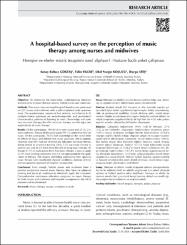| dc.contributor.author | Baltacı Göktaş, Sonay | |
| dc.contributor.author | Yıldız, Tülin | |
| dc.contributor.author | Nargiz Koşucu, Sibel | |
| dc.contributor.author | Ateş, Duygu | |
| dc.date.accessioned | 10.07.201910:49:13 | |
| dc.date.accessioned | 2019-07-10T19:55:56Z | |
| dc.date.available | 10.07.201910:49:13 | |
| dc.date.available | 2019-07-10T19:55:56Z | |
| dc.date.issued | 2016 | en_US |
| dc.identifier.citation | Baltacı Göktaş, S., Yıldız, T., Nargiz Koşucu, S. ve Ateş, D. (2016). A hospital-based survey on the perception of music therapy among nurses and midwives. European Journal Of Therapeutics, 22(4), 190-196. https://dx.doi.org/10.5152/EurJTher.2016.0106 | en_US |
| dc.identifier.issn | 2564-7784 | |
| dc.identifier.issn | 2564-7040 | |
| dc.identifier.uri | https://dx.doi.org/10.5152/EurJTher.2016.0106 | |
| dc.identifier.uri | https://hdl.handle.net/20.500.12511/2475 | |
| dc.description | WOS: 000439241100003 | en_US |
| dc.description.abstract | Objective: To determine the knowledge, understanding, behavior, and practices of music therapy among Turkish nurses and midwives. Methods: This was a cross-sectional hospital-based survey performed on 225 nurses and midwives with a self-completed study questionnaire. The questionnaire consists of five sections, each having 4-20 multiple-choice questions on socio-demographic and professional characteristics, patterns of listening to music, knowledge and opinions on music therapy, the effect of music therapy on vital signs, and applicability of music therapy. Results: Of the participants, 194 (87.8%) were nurses and 27 (12.2%) were midwives. Almost all the participants (99.1%) stated that they like music. Of the participants, 70.6% had knowledge on the health-related effects of music and believe that music positively affects patients. However, over 90% had not received any education on music therapy during formal or in-service training. Only 7.7% use music therapy in patient care, and 36.2% have never thought of using music therapy. Although 67.4% of participants think that music therapy is easy to apply, 52.0% have working conditions which is not appropriate for the application of therapy. The reasons preventing participants from applying music therapy were insufficient physical conditions, shortage of time, and unsupportive approach of hospital management. Conclusion: Even though Turkish nurses and midwives have a positive perspective toward music therapy, they have no adequate training and physical conditions to effectively apply this treatment. Comprehensive continuous education programs on music therapy for both nurses and midwives and hospital managements should be planned and implemented. | en_US |
| dc.description.abstract | Amaç: Hemşire ve ebelerin müzik terapisi üzerine bilgi, algı, davranış ve uygulamalarının belirlenmesi amacı ile planlandı. Yöntem: Kesitsel olarak 225 hemşire ve ebe üzerinde yapılan çalışmada bilgiler anket uygulanarak toplanmıştır. Anket, sosyodemografik ve profesyonel özellikler, müzik dinleme şekli, müzik terapi üzerine bilgiler, müzik terapisinin yaşam bulguları üzerine etkileri ve müzik terapisinin uygulanabilirliği ile ilgili her biri 4-20 adet çoktan seçmeli sorudan oluşan beş bölümden oluşmuştur. Bulgular: Çalışmaya katılanların 194’ü (%87,8) hemşire, 27’si (%12,2) ise ebelerden oluşuyordu. Katılımcıların tamamına yakını (%99,1) müzik dinlemeyi sevdiğini belirtti. Katılımcıların %70,6’sı müziğin sağlıkla ilişkili olduğu bilgisine sahipti ve müziğin hastaları pozitif olarak etkilediğine inanıyordu. Ancak katılımcıların %90’ından fazlası örgün veya hizmetiçi eğitimi boyunca müzik terapisi üzerine eğitim almamıştı. Sadece %7,7’si hasta bakımında müzik terapisini kullanmıştı ve %36,2’sı müzik terapi kullanmayı hiç düşünmemişti. Katılımcıların %67,4’ü müzik terapi uygulamasının kolay olduğunu düşünürken, %52’sinin çalışma koşulları müzik terapi uygulamaya uygun değildi. Yetersiz fiziksel koşullar, zaman kısıtlılığı ve hastane yönetiminden sınırlı destek alınması, müzik terapi uygulamasına engel olan başlıca nedenlerdir. Sonuç: Hemşire ve ebeler müzik terapisine olumlu yaklaşmaktadır. Ancak bu tedaviyi etkili bir şekilde uygulamak için yeterli düzeyde eğitime ve fiziksel şartlara sahip değillerdir. Hemşire ve ebeler ile hastane yöneticileri için müzik terapi üzerine, detaylı ve sürekli eğitim programları planlanmalı ve uygulanmalıdır. | en_US |
| dc.language.iso | eng | en_US |
| dc.publisher | Aves Press LTD | en_US |
| dc.rights | info:eu-repo/semantics/openAccess | en_US |
| dc.subject | Music Therapy | en_US |
| dc.subject | Nurses | en_US |
| dc.subject | Surveillance Study | en_US |
| dc.subject | Müzik Terapisi | en_US |
| dc.subject | Hemşire | en_US |
| dc.subject | Anket Çalışması | en_US |
| dc.title | A hospital-based survey on the perception of music therapy among nurses and midwives | en_US |
| dc.title.alternative | Hemşire ve ebeler müzik terapisini nasıl algılıyor? Hastane bazlı anket çalışması | en_US |
| dc.type | article | en_US |
| dc.relation.ispartof | European Journal Of Therapeutics | en_US |
| dc.department | İstanbul Medipol Üniversitesi, Sağlık Bilimleri Yüksekokulu, Hemşirelik Bölümü | en_US |
| dc.authorid | 0000-0002-8168-1287 | en_US |
| dc.identifier.volume | 22 | en_US |
| dc.identifier.issue | 4 | en_US |
| dc.identifier.startpage | 190 | en_US |
| dc.identifier.endpage | 196 | en_US |
| dc.relation.publicationcategory | Makale - Uluslararası Hakemli Dergi - Kurum Öğretim Elemanı | en_US |
| dc.identifier.doi | 10.5152/EurJTher.2016.0106 | en_US |


















